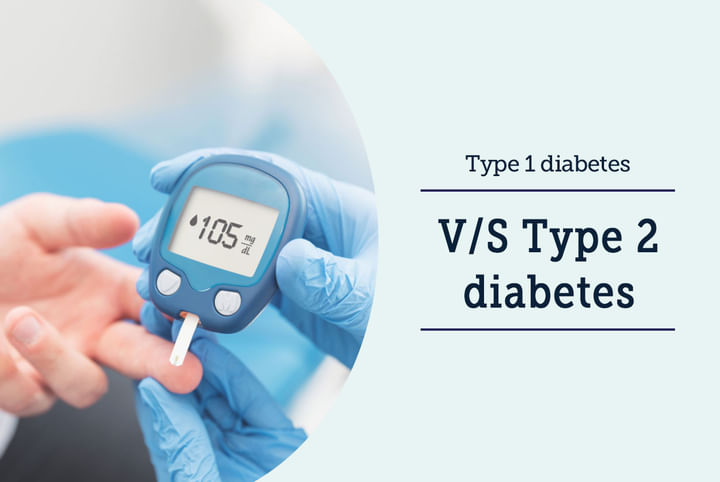Type 1 diabetes V/S Type 2 diabetes!
The two primary types of diabetes are Type 1 and Type 2. Both the types cause blood sugar levels of your body to increase higher than the normal rate. They affect the way the cells in your body produce and utilize insulin.
In Type 1 diabetes, the body does not produce enough insulin. If you have Type 2 diabetes, your body does not respond to insulin properly. Both the conditions have their own set of causes, symptoms and approach to treatment.
Causes
- Type 1 diabetes
In this condition, your immune system confuses the healthy cells for foreign invaders, such as bacteria or a virus. The immune system attacks the beta cells in the pancreas that produce insulin, as a result, the pancreas is unable to produce insulin.
The exact reason behind the immune system attacking the beta cells is not clearly known. Research suggests that it may be due to exposure to viruses or genetic factors.
- Type 2 diabetes
In Type 2 diabetes, your body produces insulin but is not able to use it effectively. The cells in the body will become resistant to insulin. So a greater amount of insulin is required to keep the blood glucose level normal. The pancreas might wear out by producing this additional amount of insulin and later produce less.
Symptoms
There are some similar symptoms for both types of diabetes –
- Frequent urination, especially during the night
- Feeling very tired than usual
- Excessive thirst
- Blurred vision
- Wounds and cuts do not heal quickly
- Unintentionally losing too much weight
- Genital itching
Patients having Type 1 diabetes might feel irritated and have frequent mood swings. The symptoms develop very fast. It is also possible that Type 1 diabetes is developed during adolescence or later in life.
People suffering from Type 2 diabetes may feel a tingling sensation along with numbness in their hands and feet. The symptoms may not develop for years. The patient may find out about the condition when it has reached an advanced stage.
Treatment
- Type 1 diabetes
Type 1 diabetes patients take injections to cope with the lack of insulin. It is injected in the stomach or arms many times a day. Insulin pumps are also used to send a steady flow of insulin to your body. The blood sugar is regularly tested to keep a check.
- Type 2 diabetes
In Type 2 diabetes, the doctor recommends a healthy diet and an active lifestyle. Exercising daily – working out or jogging will help manage your weight. You must avoid consuming fatty foods and excess sugars. Along with these measures, medication is also prescribed to keep the blood glucose level in check.
It is recommended that you strictly follow the instructions given by the doctor. Frequent check-ups and a low-calorie diet will help in keeping the two types of diabetes at bay.


+1.svg)
